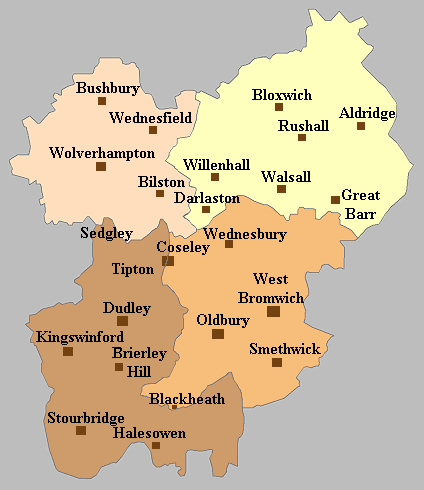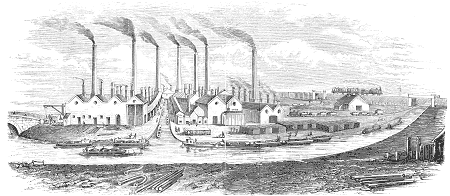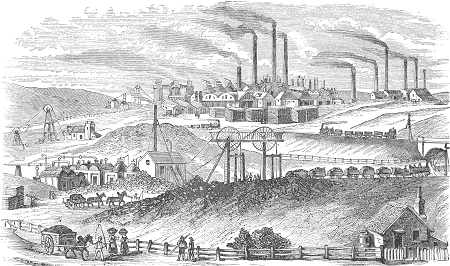| The Black Country and
its Industries |
|

The Black Country. |
Over the last 50 years the Black Country has changed
beyond recognition, much of it becoming rural in
character. Few traces remain of the once great
industries and the mining that dominated the area. It
is now hard to imagine how things were, and how people
used to live in those not too far off days.
In 1872 Samuel Griffiths wrote his excellent Guide to
the Iron Trade of Great Britain, which was published the
following year. It includes much about the Black Country
including the following description of the main
industries of the time.
The original does contain a few errors which I have
amended. |
|
It has been known from ancient
times that Staffordshire was rich in ironstone and coal.
Plott often refers to this circumstance in his history
of Staffordshire. Even in more remote ages, during the
Roman occupation, iron was manufactured in the
neighbourhood of Dudley by primitive means then in
vogue, charcoal was made from the wood of the dense
forests which at that time overspread the undulating
territory, now in the possession of the Earl of Dudley,
the priceless value of which could not be accurately
estimated at the present day, owing to the inexhaustible
seam of coal varying from ten to fifteen yards in
thickness, the best quality in the world for iron making
and ironstone, which the crust of the earth contains in
this vast princely domain.
The Black Country commences at
Wolverhampton, extends eastward a distance of sixteen
miles to Stourbridge, eight miles to West Bromwich,
penetrating the northern district through Willenhall to
Bentley, Walsall, Birchills, and Warley; embracing under
its darkened canopy of smoky atmosphere the townships of
Wolverhampton and Willenhall, with their locks and
japannery, their curry combs and boiling cauldrons of
galvanizing spelter; Walsall and Darlaston, with their
stirrups and bridle bits, nuts, bolts, and other railway
appliances; Wednesbury, with its gas-tubes, foundries,
gun-locks, and coach springs; Smethwick and Dudley Port,
with a thousand swarming hives of metallurgical
industries on the banks of the rail and canal companies,
too numerous to mention.
In this immediate vicinity we have
Chance's monster glass works at Spon Lane; and the great
alkali works of the same firm at Oldbury. Here we have
likewise Muntz's patent metal works. The great works of
the Patent Nut and Bolt Company, the Patent Rivet
Company, the Plate Glass Company, and Joshua Horton's
boiler yard, of worldwide fame, are all situated at
Smethwick. |

W. Barrows and Sons' Bloomfield Iron Works at
Tipton.
| West Bromwich and Hilltop are contiguous; here
enamelled and tinned pots, kettles, and saucepans are
manufactured, in all shapes and sizes, on the most
extensive scale. Oldbury lives close by, where with
bated pulsation, under a constant cloud of black smoke,
the vivifying rays of the sun being obscured here by the
volumes of almost material carbon floating in the
atmosphere. On the one hand there is the destructive
effect of the smoke on vegetation, on the other, of the
hydrochloric, sulphurous, and chlorine gas evolved from
numerous chemical works almost in the heart of this
devoted township. Bright grates and fire-irons become
rusty in a single night, and all household furniture,
which is held together by appliances of iron, suffers
much, and all other metals are damaged by these gases in
the same proportion. Iron mines and collieries
surround the town, the workmen, on their return from
work at the pits in the evening, show honourable traces
of the useful labour they have performed, in the soiled
garments and dirty faces they present. Vegetation
succumbs altogether; scarcely a shrub, a tree, or a
green field is to be seen, amid the general devastation
of the surface, which presents itself for miles round.
The monotony of the landscape being broken only by
irregular mounds of earth and mountains of furnace
cinders, the former being the disembowelled crust of the
earth, removed and brought to grass by the toiling
miners, in search of the valuable ironstone and black
diamonds; so plentiful in the geological formations of
the entire district surrounding Oldbury.
The heaps of furnace cinders are the glassy refuse of
molten silica, and lime, which the blast furnace
discharges in her process of separating the metal from
its matrix, before the iron is consolidated and run out
into the pig beds, a considerable quantity of lime being
requisite with the ore and coal in the furnace to
facilitate the smelting process. Nothing to be seen by
day but smoke, heaps of furnace cinders, and abnormal
mounds of earth and coals, and by night, the lurid glare
of a thousand burning furnaces of various colours, from
the blood red of the puddling furnaces, to the yellow
and blue flame of the copper works, and the chequered
red and white flames, emitted in the largest volumes,
from the tunnel heads of the blast furnaces, which may
be seen in the distance all round the town. |

The Earl of Dudley's thick coal pits.
|
We next come to Dudley, an
important town, completely surrounded on three sides by
smoke and flame. This is a great emporium for chains,
cables, anchors, grates, fenders and fire-irons, and,
above all, for wrought nails, which are brought by the
nailers from Sedgley, Gornall, Brierley Hill, the Lye
Waste and other districts. The nail factors supply the
iron to the men, who produce the nails at a scale of
prices mutually agreed upon per pound. Anvils, vices,
stove grates, and fenders are likewise made here on a
large scale, and a very high class of grates, fenders
and fire-irons are made at Marsh's works at Burnt Tree.
Most of the land in the
neighbourhood belongs to the Earl of Dudley, whose agent
(Mr. Fisher Smith) resides at the Priory, situated in a
lovely spot, the grounds of which are charming in the
extreme. Frequently while walking and talking with the
late Mr. Richard Smith, the former agent, in these
grounds, as early as six o'clock on a summer morning, we
have remarked to him that this is truly a lovely oasis
in the Black Country. Dudley Castle, a fine old monument
of the feudal ages, proudly crowns the Castle Hill, in
front of the Priory, and is a place of great resort for
tourists and pleasure-seekers, who, by permission of the
noble Earl of Dudley, have every facility for exploring
this fine old ruin, which stands upon gigantic caverns,
often illuminated with gas, on state occasions, to
gratify the Black Country people, and, as may be
supposed, his lordship and the noble countess are very
popular with the people.
Brockmoor, Brettle Lane, Wordsley,
and Stourbridge, must be included in the Black Country
group of towns. Although the atmosphere becomes purer as
we get to the higher ground of Brierley Hill (Lord
Dudley's famous Round Oak Works are here), nevertheless
here also, as far as the eye can reach, on all sides,
tall chimneys vomit forth clouds of smoke, and the
sulphurous flames of the fiery furnace are observed in
all directions. Our feeble efforts to describe these
districts will, we hope, satisfactorily explain why it
is so emphatically called the' Black Country.'
In this, the Stourbridge and
Brierley Hill district, a very extensive business is
carried on in the manufacture of fire-bricks of all
kinds, used in the construction and relining of blast
furnaces, puddling furnaces, cupolas, and air furnaces.
The fire-clay deposits here are reputed the best in
England, being fashioned into melting pots and
gas-making retorts, which fetch high prices; these
bricks are exported largely, and are highly prized in
all parts of the world, particularly the foreign
settlements of the British Empire, the general opinion
being that they resist the highest temperatures in
smelting furnaces of any others which have yet been
produced. Perhaps Ruffords, Mrs. Emily Gibbons, and
Pearson and Harrisons, make the best quality. Mrs.
Gibbons, relict of the late Benjamin Gibbons, Esq., the
well-known ironmaster of the Millfields furnaces, we are
informed by Mr. Jones, of the Commercial Gas Works, here
stands unrivalled for the manufacture of these Gas
Retorts. |
 |
Return to Black
Country Towns |
|